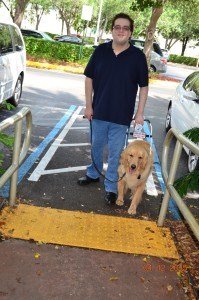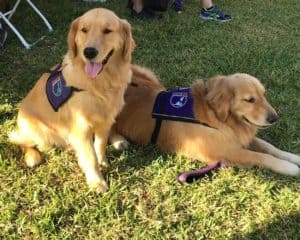Considering a service dog?

The decision to apply for an assistance/service dog is one that should be given great consideration from a variety of perspectives. In this blog I want to share my family’s experience and hopefully provide you with some insight into the types of things you should be honestly discussing with family and friends before you submit an application.
There are many things to think through when deciding if an assistance dog will be helpful to you, your child, or another loved one. Obviously you don’t need a prescription for a service dog, but you may be asked for one. It is a really good idea to get your doctors input. If you decide to apply for an assistance dog through Genesis, you will be asked to supply: your medical information including physician name(s), the diagnosis that has resulted in your disability, a reference letter from your doctor and two other personal references. You should discuss the subject with the doc during this decision-making phase.
Dogs are amazing animals. They can retrieve dropped items, open doors, and turn lights on and off. They can provide stability for those with an altered gait; find a cell phone and, of course, provide companionship and pure unadulterated loyalty and love. If you or your loved one requires assistance in performing these kinds of tasks, then a mobility assistance dog will more than likely be the key to independence by providing you with greater ability to navigate out and about in your community.
If you are looking for a service dog that will alert to certain medical conditions such as an on-coming seizure or detect low or high blood sugar levels; you are seeking a medical alert dog. Genesis trains mobility assistance dogs.
There are many types of recognized service dogs. Psychiatric support dogs, PTSD dogs, medical response dogs, and autism dogs to name the most familiar. The key thing to remember is a service dog is trained to perform at least one specific task to mitigate his handler’s disability, and the handler must have a disability as defined by the ADA. That generally means the person has a physical or mental impairment that substantially limits one or more major life activities, a person who has a history or record of such impairment, or a person who is perceived by others as having such impairment.
When my son, Andrew, decided that a mobility assistance dog would be helpful to him, he then gave thought as to whether or not an assistance dog would be a good fit with our family. Above all, he gave serious thought to the state of his finances. Would he be able to afford food, training treats, veterinary care, flea prevention, heartworm prevention, grooming items and/or services, toys, dishes and a bed? Andrew was also concerned about there being enough room in the house for another dog bowl, dog bed and a place to store food as we already had a black lab in the family.
Andrew also had to make an honest assessment of his own stamina. Would he be able to give a dog enough exercise and keep up with constant training at home? Would walking the dog and cleaning up after it be something he could do several times a day every day? If he was having a bad spell or was hospitalized could he rely on family members to appropriately care for his service dog? Andrew lives at home and we all promised to give assistance whenever it was needed. Please discuss this with your family and extended support system in your decision making process. It provides great peace of mind to know that your dog would never be neglected in a crisis situation.
Consideration of the family dynamics and whether or not anyone in the family has allergies that might be triggered by a dog are topics that cannot be avoided. Luckily for us this wasn’t a problem. If allergies are an issue in your situation, you might contemplate looking at a breed that doesn’t shed much. If you already have a family pet you need to know if it will be receptive to another animal being introduced into the household. Our Samantha is so laid back we knew it wouldn’t be an issue. (And it wasn’t.)
Once all of these subjects had been discussed with the doctors, our family and friends Andrew decided that a service dog would greatly add to his life. He and I researched service dog organizations and ultimately he decided that Genesis Assistance Dogs, Inc. was where he would submit an application. Eventually he was paired with Motive and his life is richer for it.
The one question that neither Andrew, nor our family, ever thought to prepare for, yet one that I know now is not to be overlooked is this – How well do you deal with the public? None of us were prepared for the attention having an assistance dog would bring to Andrew when he is out and about. There are people who will just smile and keep moving. There are folks who recoil with surprise and uncertainty. There are people who will just march right up and reach out to touch the dog and still others who wish to regale Andrew with their knowledge of the breed, or of others they know with service dogs. Remembering that he is always an ambassador for Genesis Assistance Dogs, Inc., Andrew has adapted well to answering questions, protecting Motive from unwanted and unsolicited petting and denying access to Motive when he decides it not his best interest to have Motive be distracted from doing his job to help keep Andrew stable. If you are not a people person you will need to consider what coping mechanisms you will employ when out with your dog.
You would be doing yourself, and your assistance dog-to- be, a disservice by not giving ample consideration to the journey you are about to embark on. Hopefully I have given you some food for thought. Being paired with an assistance dog is an amazing experience that will definitely enrich your life. Be certain that you have pondered the responsibilities and precautions in determining if a service dog is right for you.
In an upcoming blog I will be delving deeper into the specific categories of service dogs, the assistance they provide, the training they receive and what protections are provided under the ADA. Come visit again soon!

